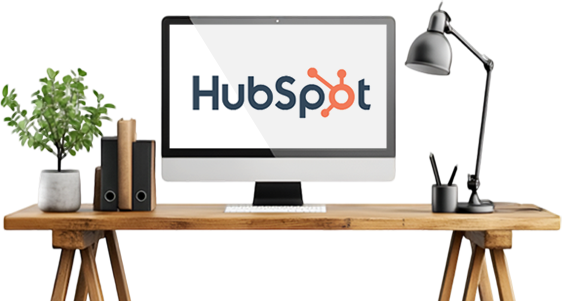Case Study: Commercient SYNC APP
Increase Efficiency with ERP Integration for a CRM
.png)
ERP Integrations for HubSpot
Commercient, a Software as a Service (SaaS) technology company specializing in integrating ERP and CRM systems, has been connecting ERPs with CRMs like HubSpot for over 10 years.
Connecting ERP integrations with a CRM like HubSpot can help businesses streamline their processes and increase the accuracy and efficiency of their data management.
What is an ERP Integration?
An ERP (Enterprise Resource Planning) integration is the method of connecting your ERP software with other systems to create a unified platform. The integration allows for the exchange of information between departments, such as accounting, marketing, operations, and more, in order to streamline processes, improve efficiency, and reduce costs.
Businesses of all sizes and in all sectors can benefit from an ERP integration, but it is especially useful for those with complicated operations, multiple systems, or the need to streamline their processes.
Benefits of ERP Integrations
ERP integrations have many benefits to offer businesses, including the following.
- Improved data accuracy and consistency: ERP integrations help to remove manual data entry errors and ensure that data is consistent across the organization. If a company didn’t use an ERP integration, it would have to manually input all inventory counts into its ERP system and e-commerce platform, which creates a lot of extra work.
- Better data management: Integration stores all data in one place, making it easier for businesses to access and manage their data.
- Reduced costs: ERP integrations can reduce costs by eliminating the need for manual data entry, as well as reducing the need for expensive hardware and software.
- Improved decision-making: Real-time access to data and analytics helps businesses make informed decisions quickly.
- Enhanced supply chain management: Integration of ERP with supply chain management systems can help to streamline processes, improve communication, and reduce costs of manufacturing and distribution.
- Better customer service: Integration of ERP with CRM systems can improve customer service by allowing sales and support teams to handle customer inquiries and requests more effectively.
Using an ERP Integration for CRM
CRM systems manage customer data like purchases and contact information, which can be used by sales and marketing teams. Businesses use this data to gain better insights into customers and make informed decisions when it comes to interacting with them.
Integrating an ERP with a CRM allows for the exchange of data between the two systems, enabling the sharing of customer data, sales data, and other business-critical information between different departments.
The result is a more streamlined, efficient, and effective sales process, as well as improved customer satisfaction through the use of more complete and precise data.
HubSpot ERP Integration Apps
Using an ERP integration with HubSpot CRM enables businesses to streamline processes, improve data accuracy, and drive better business outcomes by bringing together critical data from both systems into a single platform.
HubSpot can be connected with popular ERP systems, including NetSuite, SAP, Microsoft Dynamics, and more. In the HubSpot App Marketplace, you can find a list of ERP integrations available.
Here are a few of the most popular ERP integration apps used in conjunction with HubSpot’s CRM.
-2.png?width=240&height=60&name=Untitled%20design%20(5)-2.png)
Quickbooks Integration
Integrating QuickBooks with HubSpot allows businesses to transfer financial data between the two systems.

Zoho Integration
Integration with Zoho allows businesses to automate the transfer of data between their HubSpot CRM and Zoho ERP systems.
What is Commercient SYNC Data Integration?
The Commercient SYNC app is designed to enable businesses to seamlessly integrate their ERP and CRM systems.
Commercient’s SYNC app makes it possible to see your ERP data in your CRM. Unlike a toolset, the Commercient SYNC data integration allows CRM users to see ERP data without having to access the ERP. That way, data updated in the ERP will be SYNCed and updated in HubSpot.
The goal of the Commercient SYNC app is to provide organizations with a more integrated and streamlined sales process, while also improving customer satisfaction.
We partnered with Commercient to implement SYNC HubSpot and ERP data integration. Having the ERP data SYNC’d by Commercient to HubSpot helps our clients make better decisions and enhances how they can market to customers. For example, you can set up marketing automation for a customer based on their purchase history.
Commercient offers integrations for more than 110 unique Accounting Systems with HubSpot CRM including:
Quickbooks

Epicor

Infor

Netsuite

Get Started With ERP Integrations for HubSpot
An ERP integration can have a huge positive impact on a business. It can help make businesses more efficient, reduce costs, and improve decision-making processes. If you are looking to streamline your business processes, an ERP integration may be exactly what you are looking for.
If you’re ready to start implementing HubSpot CRM with an ERP, reach out to Commercient to get started with their SYNC app.
Who Uses Commercient SYNC App?
Companies of all sizes and industries use Commercient's services to integrate their ERP and CRM systems. Commercient's clients include small businesses, mid-sized companies, and enterprise-level organizations that need to manage large volumes of data across multiple systems. Whether a company uses QuickBooks, NetSuite, Microsoft Dynamics, or another ERP system, Commercient can help them integrate their data with popular CRM platforms like HubSpot.
/Imported_Blog_Media/Website-Visitors-2-300x199-4.jpg)

Atlanta Braves

Volvo

Brembo

Viking

Peer Recognition
Award Winning Agency

Netty Award Boutique Agency of the Year
2023

Internet Marketing Association Impact Award
2017

HubSpot Impact Award for Growth-Driven Design
2016


